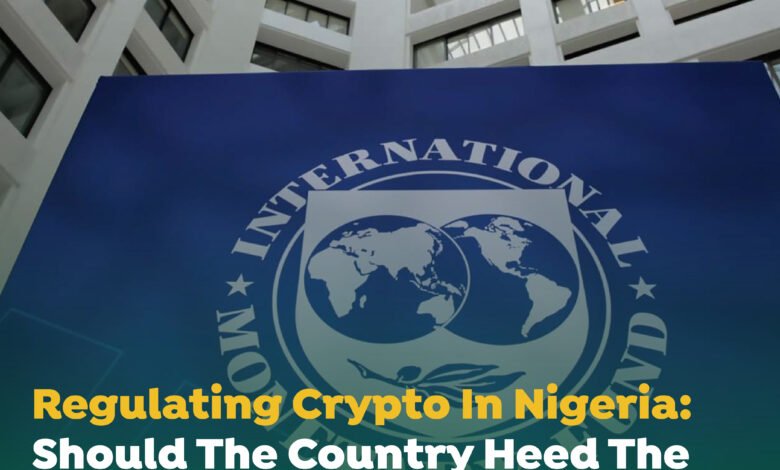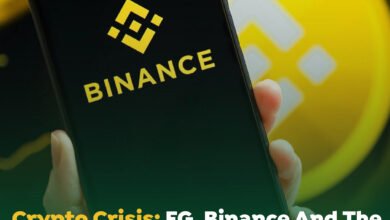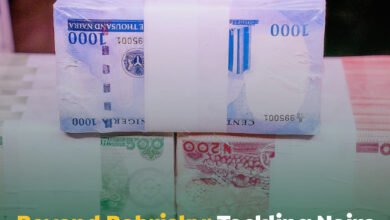Regulating Crypto in Nigeria: Should the country heed the IMF’s advice?

The International Monetary Fund (IMF) has a reputation for wielding immense financial influence, but not always with a golden touch. Past policy prescriptions have sparked debates, with some arguing they’ve caused more harm than good.
Now the world body has waded into the murky waters of cryptocurrency regulation in Nigeria, offering recommendations amidst an ongoing legal battle between the Nigerian government and crypto giant Binance
In its recommendation published on the 10th May 2024, it noted that “global crypto trading platforms be registered or licensed in Nigeria.” It added that they should be subjected to similar regulatory criteria “applicable to financial intermediaries, following the principle of same activity, same risk, and same regulation.”
Unsurprisingly, the IMF’s suggestion has sparked mixed reactions. Crypto enthusiasts see it as a potential path towards a more regulated and legitimate crypto market in Nigeria. However, skeptics remain cautious, citing the inherent risks associated with cryptocurrencies and the potential for misuse.
IMF, BINANCE and Nigeria
The Nigerian government dragged Binance to court after banning its operations as well as other cryptocurrency platforms in the country. The government alleged that the company evaded tax while operating in Nigeria and served as a conduit for money laundering and terrorism financing.
In addition, the government also alleged the company of sabotaging the country’s currency through speculation and fixing of exchange rate while undermining the government’s efforts to strengthen the local currency against the US dollar. Financial experts say the weakness of the naira contributed to the food inflation and high cost of living being witnessed across the country.
Nigeria’s apex bank governor, Olayemi Cardoso, had disclosed that in February 2024, a whopping $26 billion worth of illicit funds were laundered through Binance Nigeria. “In the case of Binance, $26 billion has passed through Binance Nigeria from sources and users we cannot adequately identify,” Cardoso said.
Binance, whose staff had been detained by the government before the legal framework began, was later asked to pay a $10bn (£8bn) fine to the country’s coffer. But it denied being complicit in money laundering. And recently, its CEO, Richard Teng, accused some officials of the Nigerian government of asking him to pay them for the matter to be swept under the carpet.
‘Teng’s Bribery Allegation Knocked’
In a blog post which appeared in the New York Times, Teng said some officials of the Nigerian government approached him to pay a staggering $150m into a secret account if he wanted the allegations against his platform to be shelved. The government, in a swift response, asked him to reveal the identity of the officials. But Teng has not responded, nor has he named the officials he claimed asked him for a bribe.
‘Binance beyond Nigeria’
When Binance was banned in Nigeria for alleged tax evasion, money laundering, and terrorism financing, some believed were mere allegations from the government to clamp down on the world’s leading cryptocurrency platforms. However, recent reports revealed that Binance is rather facing global scrutiny as it has been banned in Canada, China, Japan, Italy, the United States, Australia, Netherlands, Germany, France, and the United Kingdom, among others, for similar allegations.
Experts weigh in
Citing the countries where crypto trading has been banned for the same allegations, experts urge the government not to hastily implement the IMF’s recommendation, which states that global crypt trading platforms should be registered and licensed in Nigeria. They argue that rushing to implement such a recommendation without proper structure could plunge Nigeria into an intense economic crisis.
Some have argued that the absence of Binance and other crypto trading platforms would worsen the country’s economy. However, experts say the economy will rather boom as investors will have confidence in investing in Nigeria, and technology hubs would continue to appear “because of research and development costs.”





